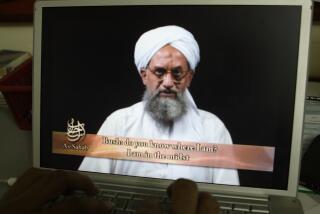African Union Feuds Over Leader
- Share via
KHARTOUM, Sudan — In a rare political snub of one of their own, African leaders today opposed Sudanese President Omar Hassan Ahmed Bashir’s controversial bid to take over the chairmanship of the African Union.
After meeting in closed session for most of the day at its annual summit here in the Sudanese capital, feuding heads of state in the 53-nation African body referred the issue to a special committee. That panel said today it was prepared to offer Denis Sassou-Nguesso, president of the Republic of Congo, as a compromise candidate.
Although Bashir could contend again for the post next year, the reluctance of some of his colleagues to elect him on the first day of the two-day Khartoum summit was an embarrassing setback for the former military coup leader, who was the only candidate openly vying for the chairmanship.
Bashir’s candidacy was met with staunch opposition behind the scenes from several leaders who questioned whether his nation’s poor human rights record in the western region of Darfur would tarnish the alliance’s image.
U.S. officials also questioned whether the crisis in Darfur would represent a “conflict of interest” for Bashir considering the African Union’s role in deploying nearly 7,000 peacekeepers to the area and in mediating Sudanese peace talks being held in Nigeria.
Human Rights Watch representatives told summit leaders that Bashir’s appointment would send an “extraordinarily negative message to civilians in Darfur” and represent “enormous hypocrisy” on the part of the continental organization.
“This is a test for the AU,” said Reed Brody, an attorney for the organization, which is based in New York.
“There’s a lot of uneasiness about Africa being represented in the world by an international pariah.”
The Sudanese government is accused of responding to a rebellion in Darfur by unleashing bands of Arab-dominated militias, known as janjaweed, to kill and terrorize the non-Arab residents of the region. More than 180,000 people have died and 2 million have been displaced since the fighting broke out in 2003.
The International Criminal Court is investigating several Sudanese officials for their roles in the conflict. The U.S. government has labeled the crackdown in Darfur as genocide and imposed trade sanctions on Sudan. Khartoum has also been criticized for its alleged links to terrorism in the past.
The chairmanship debate largely overshadowed the African Union’s 6th Ordinary Session, which was meant to focus on education and culture.
As talks bogged down Monday evening, Sudanese officials, who previously had been insisting that Bashir should assume the post, began to downplay the issue’s importance.
“We don’t want to make any cracks in the union,” Sudanese presidential aide Mustafa Osman Ismail said as he left the conference hall. “If that means Sudan should withdraw, we will withdraw.”
For Bashir, ascension to the AU chairmanship would have represented an opportunity to demonstrate that his country is regaining international respect. In recent days, state-controlled media had been heralding his expected election.
Bashir supporters said he deserved credit for forging a peace deal last year with southern rebels, ending a 20-year civil war and creating a new coalition government. But the separate Darfur rebellion, which picked up just as the southern war quieted down, has been harder to resolve.
Rebel leaders in Darfur have warned in recent days that they would withdraw from AU-sponsored peace talks if Bashir was elected chairman of the organization.
Leadership of the African Union would have given Bashir added clout on several key issues, including a proposal to send United Nations peacekeepers to assist AU troops in Darfur.
The Sudanese government adamantly opposes the idea.
On Monday, Bashir was quoted by the state-controlled Sudan News Agency as offering to allow the Nigerian President Olusegun Obasanjo, who is the current chairman of the African organization, to continue to handle issues involving Darfur, including the peace talks.
The panel, however, indicated it preferred Sassou-Nguesso.
More to Read
Sign up for Essential California
The most important California stories and recommendations in your inbox every morning.
You may occasionally receive promotional content from the Los Angeles Times.










